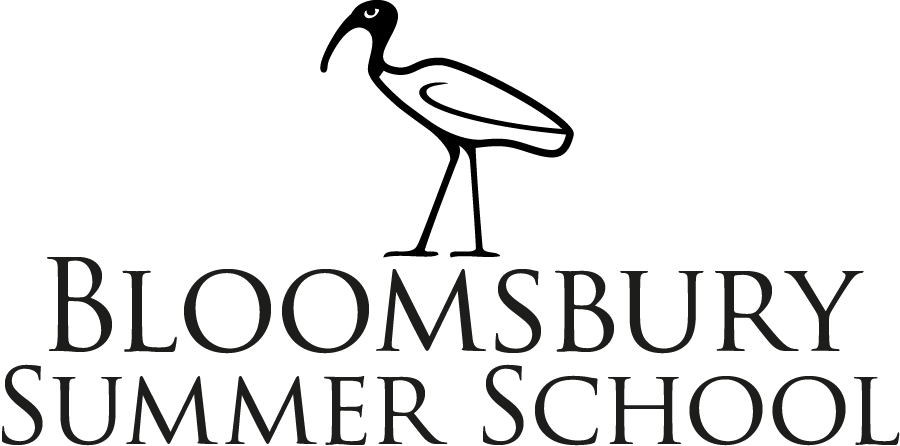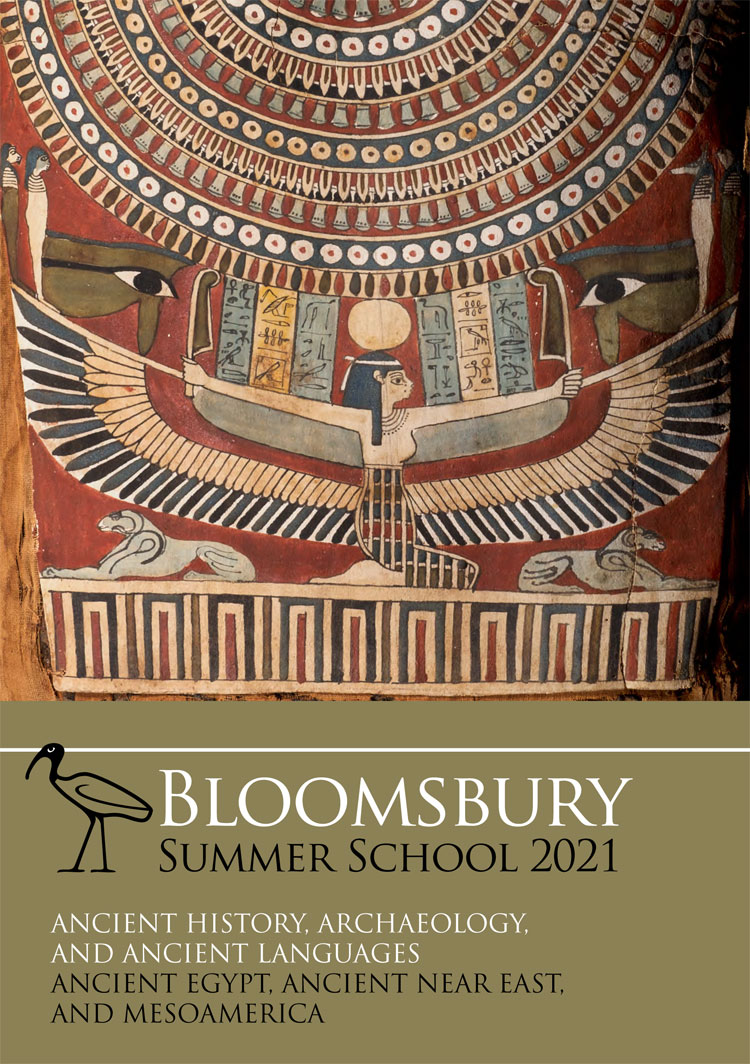
Bloomsbury Summer School

Fascinated by ancient civilisations?
We offer anyone with any level of knowledge, inspiring short courses on ancient Egypt and other areas of the ancient world.
2021 Courses – programme in detail

Saturday 6 March
This is a 1-day spring course that will be held online only.
A Taste of Hieroglyphs (For beginners) ** Fully Booked **
Course Director: Dr Bill Manley (University of Glasgow)
This course will be delivered online via the video communication platform Zoom (details provided upon enrolment).
For those of you wishing to learn how to read hieroglyphs – or perhaps you are wondering whether to take the plunge – this one-day course will show you the basics behind reading ancient Egyptian, and also give you a taste of what we do at Bloomsbury Summer School. During this pandemic year, this course also doubles as the first day of our week-long introductory course (Hieroglyphs for (Almost) Beginners (see below)). A Taste of Hieroglyphs assumes you have no prior experience in the subject but, through a series of presentations and practical sessions, aims show you how to read some pharaonic monuments on display in world famous museums by the end of the day.
NB: You are welcome to take this one-day course on its own as a stand-alone experience. However, those who wish to complete Hieroglyphs for (Almost)Beginners (see below) – including those of you who have taken A Taste of Hieroglyphs previously – will find the remaining four days available over two weekends following this taster.
- Timetable
- Recommended reading
- Course Director
- Book now
Saturday 13 to Sunday 14 and Saturday 20 to Sunday 21 March
This is a 4-day spring course split across two weekends that will be held online only.
Art and Archaeology of Mesoamerica in 100 Objects
Course Director: Dr Elizabeth Baquedano (University College London)
Guest Lecturer: Dr Gabrielle Vail
This course will be delivered online via the video communication platform Zoom (details provided upon enrolment).
We are pleased to welcome back Elizabeth Baquedano, this time to explore the cultures of the Olmecs, Mayas, Toltecs, and Aztecs through key objects from the period of c.2000 BCE to the arrival of the Spanish in 1519 CE. Jewellery, masks, coffins, and figurines fashioned from jade, gold, and other precious materials provide unique insights into daily life, religious belief, creation myths, and concepts of death and the afterlife. You will become familiar with elaborate vessel types from Teotihuacan and the symbolic meanings their iconography reveals. Elizabeth will also introduce you (virtually) to the extensive collection of ancient Mexican turquoise mosaics held in the British Museum, as well as trace the curious case of an obsidian mirror once used for divination and prognostication, that made its way to England during the reign of Queen Elizabeth I. Also, drawing on the rich collections of the British Museum you will have the unique opportunity to examine, through high-resolution images, codices made of bark paper and deerskin, dealing with administrative, religious, and historical matters.
Saturday 13 to Sunday 14 and Saturday 20 to Sunday 21 March
This is a 4-day spring course split across two weekends that will be held online only.
Hieroglyphs for (Almost) Beginners
Course Director: Dr Bill Manley (University of Glasgow)
This course will be delivered online via the video communication platform Zoom (details provided upon enrolment).
We are excited to bring back our popular beginners’ hieroglyphs course this year. Our course director has vast experience of the subject and is regarded as one of the best hieroglyphs-teachers around. The course itself offers a unique, especially written introduction to the world of Egyptian hieroglyphs and requires no prior experience (but see below). Through a series of presentations and practical sessions, you will progress from the basics of the writing and language of the ancient Egyptians to reading monuments on display in various world-famous museum collections. This course is specifically intended for complete beginners but may well appeal to anyone wishing to refresh their knowledge of hieroglyphs, too. It promises to be an intense and rewarding experience.
NB: Because of the challenging circumstances this year, we have adapted what is normally our 5-day course, Hieroglyphs for Beginners, into two parts: a stand-alone course A Taste of Hieroglyphs (see above) and this 4-day course taking place across two weekends. To enroll on Hieroglyphs for (Almost) Beginners, you should have attended A Taste of Hieroglyphs in 2020, or should enrol on it this year.
Monday 12 to Friday 16 April
This is a 5-day summer course that will be held online only.
Coptic: A course for beginners
Course Director: Dr Bill Manley (University of Glasgow)
This course will be delivered online via the video communication platform Zoom (details provided upon enrolment).
We are delighted to bring our unique introduction to Coptic back in a springtime slot after the pandemic frustrated our first attempt last year. Coptic was the language of the early Christians of Egypt, and the final phase of the ancient language of the pharaohs. Our specially written course offers you both the knowledge and the practice required to begin reading important groups of ancient texts, highlighting the wisdom of the fourth-century desert fathers, and the lives of monks and wealthy villagers at Thebes in the aftermath of the Arab invasion.
NB: This is an introduction to the Coptic language and Coptic texts, and does not presuppose knowledge of Coptic or any other language. You will be invited to study various features of the language and apply them from day one to reading ancient Coptic texts, using notes specially written for BSS. Do not worry about the intensity: there will be plenty of time for supervised reading practice and for questions and answers with your tutor.
Monday 12 to Friday 16 April
This is a 5-day summer course that will be held online only.
Death and Divinity in Graeco-Roman Egypt
Course Director: Dr Campbell Price (University of Manchester)
This course will be delivered online via the video communication platform Zoom (details provided upon enrolment).
Often overlooked in popular Egyptology studies, the Graeco-Roman Period (c.300 BCE – 300 CE) offers rich insight into the diversity of funerary practices among the elite in Egypt. Ancient motifs are reinterpreted and combined with innovative forms in order to transform the body into something everlasting and divine. For the wealthiest, this was achieved with the lustre of gold. On this course, you will overview religious conceptions behind responses to death, focussing on the collections of Manchester Museum, with lectures drawing on readings from the new book: Golden Mummies of Egypt: Interpreting identities from the Graeco-Roman Period.
Monday 21 to Friday 25 June
This is a 5-day summer course that will be held online only.
Cleopatra’s Hieroglyphs: Reading Hieroglyphic Texts from the Ptolemaic and Roman Periods ** Fully Booked **
Course Director: Dr Luigi Prada (University of Uppsala)
This course will be delivered online via the video communication platform Zoom (details provided upon enrolment).
This course offers you the unique opportunity to delve into Graeco-Roman hieroglyphic texts – a fascinating subject rarely offered, even at the university level. You will gain access to a rich corpus of texts dating from the time of the Ptolemies and the Roman Emperors, learning gradually to read from a wide selection of original material. From inscriptions on temples and tombs to obelisks and stelae, Luigi will guide you in reading texts spanning the entire Graeco-Roman Period, including those contemporary with Alexander the Great, Cleopatra and Julius Caesar, and the Emperor Hadrian, amongst others. This class also includes sessions taught on high-resolution images of written artefacts from the British Museum and the UCL Petrie Museum of Egyptian Archaeology, offering students a chance to read directly from the originals and thus best appreciate their epigraphic subtleties.
NB: This class is not intended for beginners in the study of the ancient Egyptian writing system and language. Participants will be expected to have a knowledge – at least one year’s study – of hieroglyphic Middle Egyptian. Should you be uncertain as to your knowledge level, please feel free to contact BSS.
- Timetable
- Recommended reading
- Course Director
- Book now
Monday 21 to Friday 25 June
This is a 5-day summer course that will be held online only.
Gods and Goddesses of Ancient Egypt
Course Director: Ms Lucia Gahlin (University College London)
This course will be delivered online via the video communication platform Zoom (details provided upon enrolment).
The aim of this online course is to introduce you to the world of the ancient Egyptians through their pantheon of gods and goddesses. Join Lucia Gahlin as she opens a window on to ancient Egyptian history, culture, and society through her explanations of the iconography, attributes, and worship of each deity, and how each relates to others within a rich tapestry of mythology and religion. This exploration of ancient Egyptian belief will help shed light on the life experience of the ancient Egyptians and their view of the cosmos. Each session will focus on a different deity, and by the end of the course you will have examined a wealth of varied material – archaeological, architectural, visual, and textual – covering some 3000 years of pharaonic Egyptian history. Expect a lively course, packed with vivid images and fascinating material presented in richly illustrated lectures designed to provoke thought, questions, and discussion.
Monday 21 to Friday 25 June
This is a 5-day summer course that will be held online only.
Reading Coptic: Exemplary Lives
Course Director: Dr Bill Manley (University of Glasgow)
This course will be delivered online via the video communication platform Zoom (details provided upon enrolment).
Our brand-new course for old friends and newcomers is designed to build on your skills in reading Coptic and develop your appreciation of Egyptian culture. This time we will concentrate on the biographies of exemplary figures in the Coptic tradition, including the monastic rule-giver Pachomius, and Archellites, a Roman noble whose romantic lifestory was set down in Coptic in the seventh century. You will be invited to study different aspects of the language and apply them in reading the ancient texts using notes specially written for BSS.
NB: Our course Coptic: A course for beginners taught in the spring (12 – 16 April) would be good preparation for this course. Whilst you need not have taken this introductory course at BSS, Reading Coptic assumes you do have some experience in reading Coptic texts (as a rule of thumb, you should be able to read a short narrative including the past tense and circumstantial forms.). However, do not worry about the intensity: there will be plenty of time for supervised practice and for questions and answers with your tutor. If you have taken Reading Coptic with us previously, you will find all-new content in this latest course.
Monday 28 June to Friday 2 July
This is a 5-day summer course that will be held online only.
Hieroglyphs: The next step ** Fully Booked **
Course Director: Dr Bill Manley (University of Glasgow)
This course will be delivered online via the video communication platform Zoom (details provided upon enrolment).
We are delighted once again to offer our second-stage course in Egyptian hieroglyphs. Bill Manley returns to show you The Next Step, which builds on the knowledge and skills you acquired on the course Hieroglyphs for Beginners. In a series of practical sessions, you will be introduced to increasingly elaborate monuments, including monuments made for kings as well as officials. In this way, you will develop a more sophisticated appreciation of hieroglyphic writing and the language, including: ways of talking about the king and the gods; talking about the past, present, and future; and making negative statements. Through the week you will enrich your understanding of different kinds of monuments and expand your knowledge of Middle Egyptian.
NB: The combined courses of A Taste of Hieroglyphs (for Beginners) and Hieroglyphs for (Almost) Beginners taught online in the spring across three weekends (6, 13 – 14, 20 – 21 March, would be good preparation for this course. Whilst, you need not have taken this introductory course at BSS beforehand, The Next Step assumes you do have some experience in reading hieroglyphic Egyptian. As a general guide, you should already be able to read a basic offering formula and to cope with the monuments on pages 46 and 48 of the coursebook. That said, do not worry about the intensity of the course: there will be plenty of time for supervised reading and for contact with your tutor.
- Timetable
- Recommended reading
- Course Director
- Book now
Monday 28 June to Friday 2 July
This is a 5-day summer course that will be held online only.
The Royal Tombs of Ancient Egypt
Course Director: Prof. Aidan Dodson (University of Bristol)
This course will be delivered online via the video communication platform Zoom (details provided upon enrolment).
We are thrilled to welcome back Prof. Aidan Dodson with an exciting course on the royal tombs of ancient Egypt. These include some of the most stupendous monuments of all time, containing some of the greatest treasures to survive from the ancient world. During this week, you will explore the history and archaeology of the funerary complexes of Egypt’s kings, queens, and the wider royal family, from the very dawn of history down to, and beyond, the country’s absorption into the Roman Empire, three millennia later. We will also make some short detours into the royal tombs of other nations, to compare and contrast the ways in which human beings have dealt with the posthumous destinies of their rulers.
Monday 5 July to Friday 9 July
This is a 5-day summer course that will be held online only.
Love Spells, Oracles, Amulets: Ancient Egyptian Rituals of Magic and Divination
Course Director: Dr Franziska Naether (University of Leipzig / Stellenbosch University )
With guest lectures by: Prof. Rita Lucarelli (University of California, Berkeley / Bari University) and Prof. Joshua A. Roberson (University of Memphis)
This course will be delivered online via the video communication platform Zoom (details provided upon enrolment).
We are thrilled to introduce Franziska Naether, a newcomer to the BSS programme. In this course, she will take you on a deep dive into ancient Egyptian magic – and back again! You will explore what magic meant for the ancient Egyptians compared with our views today. Lectures will examine sources dating from c.1500 BCE to 600 CE and involving all kinds of magical spells, medical magic, amulets for protection (including a practical session), and magic for communicating with the gods (including reading from oracle books). Finally, Franziska will explore with you the influence of ancient cult practices on early modern and current spiritual life, including the work of Aleister Crowley, and Napoléon Bonaparte and his “secret” book of fate.
Monday 5 July to Friday 9 July
This is a 5-day summer course that will be held online only.
Reading Hieroglyphs: Spirits in context
Course Co-Directors: Dr José Ramón Pérez-Accino (Complutense University of Madrid) and Dr Bill Manley (University of Glasgow)
This course will be delivered online via the video communication platform Zoom (details provided upon enrolment).
As ever, we have set aside a course for those of you who love to discover pharaonic Egypt by reading the ancient texts. In response to feedback in previous years, we are delighted to offer a brand-new course exploring the layout and decoration of specific tombs in order to understand the place of tomb biographies within them. In particular, we will look at the tomb inscriptions of Metjen – perhaps the earliest account of a human life in history – and Puyemra, a priest at Karnak during the reign of Thutmose III (18th Dynasty).
NB: In response to ever-increasing demand for our Reading Hieroglyphs courses, Spirits in Context will be run in two parallel groups to allow for smaller class-sizes and increased enrolment – but the content will be the same for each group. Our Reading Hieroglyphs courses assume you already have good knowledge of reading hieroglyphic Middle Egyptian. Normally, we would expect you to have taken both of the BSS courses Hieroglyphs for Beginners and Hieroglyphs: The Next Step (second stage) beforehand. As a rule of thumb, before you come along you should be comfortable reading all of the texts in How to Read Egyptian Hieroglyphs (see Recommended Reading). Do not worry about the intensity of this course: during the week, there will be plenty of time for your own work and for questions and answers with your tutors.
- Timetable
- Recommended reading
- Course Co-Director (Pérez-Accino) | Course Co-Director (Manley)
- Book now
Monday 12 to Friday 16 July
This is a 5-day summer course that will be held online only.
Ancient Persia: New perspectives
Course Director: Prof. Lloyd Llewellyn-Jones (University of Cardiff)
Guest lecturer: Mr Jack Neighbour (University of Cardiff).
This course will be delivered online via the video communication platform Zoom (details provided upon enrolment).
We are thrilled to welcome back Lloyd Llewellyn-Jones to deliver a course on the Persian Empire. You will learn about the Achaemenids (559–330 BCE), one of the great dysfunctional families of history, and their story – a saga of naked ambition, betrayal, revenge, and murder. To understand the Persian Empire, we must focus on the dynasty that controlled it. This course will thus explore the Achaemenid Empire from its humble beginnings under the brilliant leadership of Cyrus the Great to its fall to Alexander of Macedon under the dashing but unlucky Darius III. You will trace the story of the world’s first superpower – an empire built, unusually for imperial ambition, on cooperation and respect for others. Bypassing the pejorative ’histories’ created by Classical authors, this course draws on genuine Persian sources. Ancient Persia: New Perspectives is the inside history of the Achaemenid dynasty and its Empire – it is the definitive Persian Version.
Monday 12 to Friday 16 July
This is a 5-day summer course that will be held in person only (however, if UCL COVID-19 policy does not permit meeting in person, this course will be adapted for online delivery).
Stone Tools and Technologies in Ancient Egypt – postponed until 2022
Course Co-Directors: Dr Sarah Doherty (University of Oxford) and Mr Matt Szafran (Independent)
We are thrilled to welcome the ancient technologist double act of Doherty and Szafran! In this course, they will draw on the results of their own experimental archaeological research to demonstrate the different ways in which ancient Egyptians worked stone and worked using stone. You will learn about different stone types, their uses, significance, and the tools required to work them – particularly stone tools but also considering the development of copper and bronze. You will become familiar with the workshops, tools, and trades (and attitudes towards them) of ancient Egypt. You will also learn how to use your newly acquired knowledge of these processes to find toolmarks and uncover stories on original artefacts through sessions taught at the British Museum and the UCL Petrie Museum of Egyptian Archaeology. This course also features a guest lecture from Dr Campbell Price, Curator of Egypt and Sudan at the University of Manchester’s Manchester Museum, who will be discussing the prestige of stone as a material and its particular applications in sculpture.
- Timetable
- Recommended reading
- Course Co-Director (Doherty) | Course Co-Director (Szafran)
- Book now
Monday 19 July to Wednesday 21 July
This is a 3-day summer course that will be held online only.
The Great Civilisations of the Nile Valley: The land and its people
Course Co-Directors: Dr Iwona Kozieradzka-Ogunmakin and Dr Lidija McKnight (both University of Manchester)
Guest Lecturer: Dr Sarah Doherty (University of Oxford)
This course will be delivered online via the video communication platform Zoom (details provided upon enrolment).
After nearly two centuries of excavating and studying the archaeology of the Nile Valley, it may seem we know it all. But do we? Recent discoveries and multidisciplinary approaches to the past deliver new evidence and opportunities for fresh interpretation. Iwona and Lidija return to co-direct this short course examining the people and the land that shaped the great ancient civilisations that once flourished in Egypt and the Sudan. You will enjoy lectures on the environment, natural resources, animal life, and artefactual evidence, as well as examine how these informed and transformed past society through time. This exciting course presents a variety of approaches combined with modern methods of investigation that will challenge some of our long-held views and enrich your understanding of the ancient Nile Valley and its people.
- Timetable
- Recommended reading
- Course Co-Director (Kozieradzka-Ogunmakin) | Course Co-Director (McKnight)
- Book now
Monday 19 to Wednesday 21 July
This is a 3-day summer course that will be held online only.
The Lord of All: The multifaceted nature of Pharaoh
Course Director: Dr José Ramón Pérez-Accino (Complutense University of Madrid)
This course will be delivered online via the video communication platform Zoom (details provided upon enrolment).
Like a diamond with many polished faces that sparkle in the rays of the sun, Pharaoh, the king of Egypt, is a multifaceted and complex figure. Over this 3-day course, you will explore, compare, and contrast the various facets that construct the Egyptian ruler. Drawing on a wide range of artistic, literary, and other archaeological sources, you will come to understand how Pharaoh’s actions encompassed all the realms of the Egyptian world. As the material embodiment of perfection, Pharaoh provided a model for the ancient Egyptians to follow, informing their lived experience in diverse ways. From divine entity and political leader to soldier, family man and more, you will become familiar with the different faces of Pharaoh – ’The Lord of All’.
Exhibition visit
'Epic Iran' ** Fully Booked **
Friday 3 September
At the Victoria and Albert Museum
With Dr Lloyd Llewellyn-Jones (University of Cardiff)
Exhibition visits will take place in person, but remain contingent upon UK government policy regarding COVID-safe interaction. Visit time slots and prices will be determined closer to the time.
Join Lloyd Llewellyn-Jones, one of the foremost international names in Persian Studies, for a unique and personalised tour of Epic Iran – a fascinating exhibition opening soon at the Victoria and Albert Museum. During your visit you will explore 5,000 years of art, design, and culture and gain new insight into “…one of the greatest historic civilisations, its journey into the 21st century and its monumental artistic achievements, which remain unknown to many.” This tour will be the perfect accompaniment to the BSS course Ancient Persia: New perspectives, also led by Lloyd.


